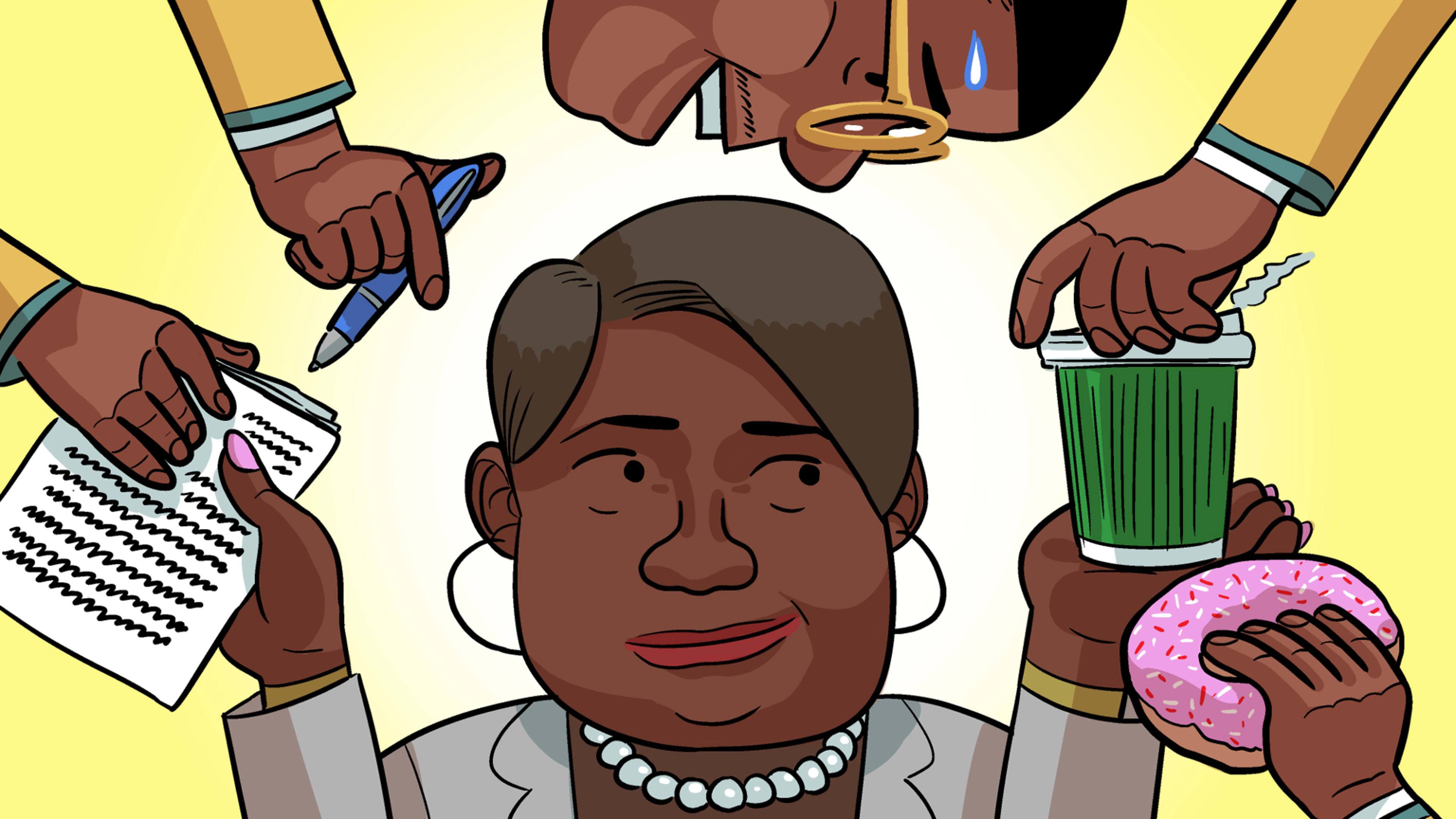‘The Only Black Guy in the Office’ is copublished with LEVELman.com.
I have a direct report named Black Karen. I’m pretty sure her driver’s license just reads “Karen,” but the distinction is important for this column’s purposes. You see, my coworker—the associate content strategist on my team—is indeed a Black woman with perhaps a misleading name. Longtime readers will recall the career crossroads she’s facing: considering law school to become a lawyer. She’s not motivated to overachieve in her day job, but still, she’s nailing all of her responsibilities. This includes general professionalism: punctuality, advance notice for planned time off, not leaving used coffee pods in the office Keurig. The basics.
As her manager, I couldn’t be happier with Black Karen. For that reason, since becoming her supervisor during our company’s reorg last year, I’ve often thought about the feedback I received from Todd, her previous manager. He and I were always cool—we’re both staunch NBA followers and he’s one of the few white guys on the job who knows how to fist bump without putting a bunch of shoulder into it like Tyson Fury. But that 30-minute meeting to discuss Black Karen’s transition was the first time we chopped it up beyond small talk. And it was then that I realized Todd knew how to get along with Black men like me just fine. But when it came to Black women he was Stacey Dash: clueless.
The takeaway from Todd’s evaluation of Black Karen centered around—you guessed it—her presumed attitude. To be clear, Todd didn’t say she had a bad attitude. Rather he described her as “hard to read” and not very motivated. “She might be a challenge,” he said to me, perpetuating a trope as classic as it is untrue.
This feedback was familiar to me because unlike Todd, I have quite a few working professional Black women in my social circle. I often hear them discuss how misunderstood they are by their bosses. Very rarely have their workplace issues boiled down to performance. Rather, these issues tend to be over differences of opinion about demeanor. The Black women I’ve talked to have shared how frustrating it is to feel the need to perform a happy-to-be-here type of dance every damn day—a corporate shuck and jive that, frankly, white folks aren’t expected to do.
When Covid protocols were lifted by leadership and a hybrid model was instituted, I wasn’t surprised Black Karen preferred the minimum of two days per week in office—with an added caveat that these chosen days could vary from week to week. I could relate. Before I got back into the swing of office life, I, too, was #TeamWFH. The problem was, I didn’t know if management (which had been encouraging three days in office) would go for it. I told her she has my complete support, but I had to clear the request with leadership, which may or may not make the exception.
Here’s where I had to get strategic. Upon reaching out to my superiors, I made the request on behalf of my team—not just Black Karen. Sure, the goal was to get Black Karen what she wanted, but my priority was protecting her. This meant not singling her out.
The next management meeting arrived. When the floor was opened for discussion, I asked about a more flexible WFH policy. Only a couple of other managers indicated they also had reports who sought less time in the office. Knowing I had some influence given my title, I tried to sway the room by asking if the policy could be considered for managers as well. Not gonna front—I was a bit shook by making the ask, as I was still relatively new to my role. You never want to be the only Black person asking for more time to work from home, but I did it anyway. It was tabled to be decided later.
A week later, senior leadership amended the hybrid policy via email, determining solid performers who preferred to spend more time working from home could do so. I was happy to report the news back to my team. In my following 1:1 meeting with Black Karen, I let her know her performance met the criteria for her to WFH more often and with more flexibility.
“Thank you so much!” she responded with enthusiasm.
“You’re welcome,” I said. “I got you.” And I meant it.
Don’t mistake this for playing favorites. The way I see it, each of my direct reports deserve my protection. But I’m also aware that nobody is more marginalized in the workplace than Black women. So I have no qualms about lending a bit of additional support.
Still, I’d be lying if I said my care for Black Karen doesn’t have a personal element. I’ll be damned if I give her a reason to complain about me to her girls during a Saturday brunch. Or to be the person who causes her to dread opening her laptop. I’m all too familiar with the phrase all skinfolk ain’t kinfolk, but unlike Todd, I don’t need Black Karen to be cool with me to see her humanity. As far as I’m concerned, as long as she’s knocking out her work like Bianca Belair, the best way I can protect Black Karen is by letting her show up exactly the way she desires.
This essay originally appeared on LEVELman.com and is reprinted with permission.
Recognize your brand’s excellence by applying to this year’s Brands That Matter Awards before the early-rate deadline, May 3.
